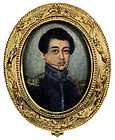Damián Domingo
| Damián Domingo | |
|---|---|
 Self-portrait, oil on ivory sheet | |
| Born |
Damián Domingo y Gabor 1796 Tondo, Manila, Spanish East Indies |
| Died |
1834 (aged 37–38) Manila, Spanish East Indies |
| Occupation | Painter |
| Religion | Roman Catholicism |
| Spouse(s) | Lucia Casas |
| Parents |
Macario Domingo (father) Gabriela Erminigildia (mother) |
Damián Domingo y Gabor (1796-1834) was a Filipino painter. Domingo established the official Philippine art academy in his residence in Tondo in 1821.[1][2]
Biography
Damian Domingo began his career as a painter specializing in miniature portraits and religious imagery. He also created albums of illustrations of native costumes. This he did primarily to sell to collectors. Such skills made Domingo one of the most famous and sought-after artists of his time in the Philippines. Domingo is regarded highly in the history of Filipino art and is credited with establishing academic courses in art in the Philippines.[3]
Establishing Art
Damian Domingo's contribution to the development of art as an academic discipline in the Philippines was seminal. He took an important step toward his vision of making art more accessible in 1821, when he established a school for artists in his residence in Tondo. It was a major leap for the discipline in the Philippines. He also oversaw the growth and development of art as the director of the first official Philippine art academy. The academy was also possibly the first of its kind in all of Asia to teach the Western techniques of foreground, middleground, and background perspectives. The academy also explored other foreign artistic techniques, an approach that helped shape the careers of the new generation of Filipino artists. When another art school, named Academia de Dibujo, opened in 1823, Domingo was offered a teaching position by its founders, the Sociedad Económica de los Amigos del País (Royal Economic Society of the Friends of the Country). Domingo later went on to serve as the director of the academy.[3]
Paintings by Damián Domingo
-

Self-portrait
-

Catedra de San Pedro en Roma
-

Nuestra Señora del Santisimo Rosario
-

Portrait of Pasqual Enrile y Alcedo
-

Self portrait
References
- ↑ "Biography of Artist Damian Domingo". Geringerart.com. Retrieved 2013-09-17.
- ↑ http://www.ayalamuseum.org/index.php?option=com_ayala_content&task=viewexhibitpage&id=7
- ↑ 3.0 3.1 "Damian Domingo:The First Great Filipino Artist". Ayala Foundation, Inc. Retrieved 17 September 2013.